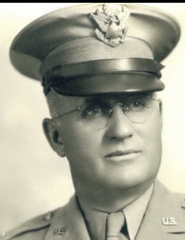Prisoners Glad to See American Girls After 27 Months Away From U.S.
By Frank Miles
Air power Press Camp in Germany (IDPA) -- An attractive, little 24-year old army nurse, sat next to me on a plane ride.
"You gentleman are of the middle west," she smiled. "I can tell it from the way you pronounce your words," she said after listening to a Chicago correspondent and me in conversation. We proudly confirmed it and told her our home towns.
At an airport where passengers got out to stretch during the loading, the nurse and two others wandered over to a tent, where their charms won them chocolate bars and lemonade.
A bare-headed sergeant accosted them.
"You are American girls, aren't you" he began.
"We surely are," they replied.
"May I just stand and look at you?", he continued. "I haven't seen an American girl for more than 27 months. I have just come from a German prison camp near Berlin."
"Well, we like to look at you too," rejoined one of the nurses. "Where are you from in the States?"
"Des Moines, Iowa"
The nurse with whom I had chatted on the plane, locked her arm in his and brought him straight to me.
"One of your home town boys who's been a prisoner," she said.
He was Sgt. Paul Kitch, captured while fighting with the 168th infantry in Tunisia on February 17, 1943. Capt. Edsel Herring, son of the former U.S. Sen. Clyde L. Herring, was at the camp he had just left. Kitch was graduated from Roosevelt high school and knew my sons.
"We were fed only a liter of soup and a small piece of bread daily in the German prisons," he told me. "But for the Red Cross packages, which we received regularly at times, many Americans would have died of hunger. I shall ever thank God for the Red Cross.
The guards were all right, "if you watched your step closely." Kitch added, "but you could get into trouble too easily."
He wore the same uniform in which he was captured. He had never had a change. He had only four hot baths in more than two years.
"The Germans always had a flock of excuses when we asked for warm water," he declared, "and as for the slim rations, civilians we saw all looked well fed and we knew our country was feeding their prisoners plenty. Is it true some American girls make over German and Italian prisoners at home?
"Yes the Germans tried to influence us with propaganda but that didn't get far."
"All aboard," our plane flight officer called out.
"Please call my wife and tell her of our meeting when you reach home," I requested as we shook hands in farewell.
The nurse extended her hand.
"May I hold it just a minute?" he beamed. "That's the first girl's hand I've had in mine for more than 30 months."
"Boys like him are wonderful," said the nurse as we reboarded the plane, "I've seen more than one come in with a leg blown off and be thankful he had one left."
I nodded.
"How I hope my boy friend I haven't seem for more than two years come through the Pacific safely," she went on in a prayerful tone. She had served in army hospitals in Africa, Sicily, Italy, France and Germany and then was going to a new assignment after her fourth siege of hospitalization for jaundice.
"I'll not let our soldiers down so long as I can stand up and they need more," she said.
About 48 hours later on the famous autobahn in Southeastern Germany I saw German women, some of whom had come far, handing bottles of wine, flowers and food to laughing nazi prisoners on American trucks. It looked like a triumphal procession to me, especially because I had just heard Hermann Goering say he could not prophesy whether Germany might fight again.
Source: Mount Pleasant News, June 9, 1945
![]()

